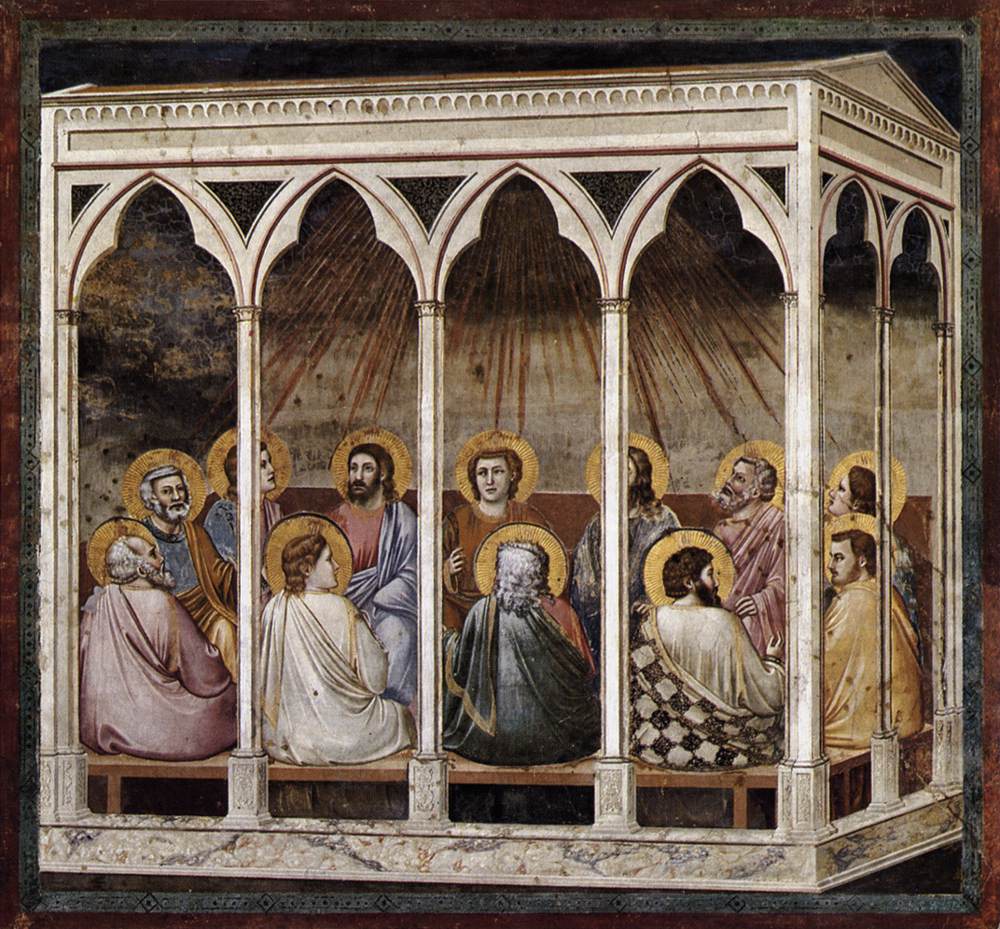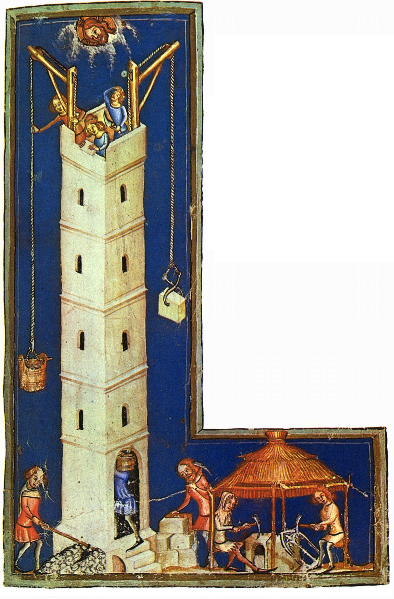
LIFE AS MYTH
![]()
JOURNAL
![]()
JOURNAL 2013
A living myth
Seven year cycles
![]()
WINTER 2013
A living faith
The chapels of the seven tongues
![]()
LIFEWORKS
![]()
ATLAS
![]()

WINTER 2013
THE CHAPELS OF THE SEVEN TONGUES
You speak a language that I understand not ...
Act III scene ii, The Winter's Tale (1610-11), William ShakespeareOne of the foremost gods in the Hindu pantheon is the ancient fire god Agni, also known as Saptajihva, meaning "having seven tongues". This fire god is referenced, whether intentionally or not, in the naming of The chapels of the seven tongues. Agni possesses two heads, three legs, seven arms and seven tongues of fire. He rides a celestial ram. With his seven tongues of fire he consumes the celestial butter. Agni is quite extraordinary to the western eye. Yet this eastern icon is not necessarily incompatible with the mythos of western Christians.
Pentecost, Giotto di Bondone. 1303-05. The Scrovegni Chapel. Padua, Italy
Weltchronik in Versen, Szene: Der Turmbau zu Babel, Meister der Weltenchronik. 1370. Bayerische Staatsbibliothek, Munich.
In Hindu mythology, the celestial butter is the byproduct of a mythic event in which all the hidden gifts of creation are brought into being. The link between divine gifts and divine fire is a motif found in the Christian tradition surrounding Pentecost. It is Pentecost that provides a bridge between east and west, between Agni and the Holy Spirit, between Old Testament and New Testament, all linking back to The chapels of the seven tongues. In the story of Pentecost disciples experience the descent of tongues of fire that bestow them with "gifts of the spirit". Among these is the ability to speak in tongues and the ability to understand them. When the day of Pentecost came, they were all together in one place. Suddenly a sound like the blowing of a violent wind came from heaven and filled the whole house where they were sitting. They saw what seemed to be tongues of fire that separated and came to rest on each of them. All of them were filled with the Holy Spirit and began to speak in other tongues as the Spirit enabled them.
Acts 2:1-4, KJV
The story of Pentecost can serve as the redemptive myth of an earlier story, The Tower of Babel (Genesis 11:1-9). In the Genesis narrative, Nimrod orders the building of the tower as an act of hubris and God punishes all of humanity with the confusion of tongues (emergence of languages). The division of voice is healed in the Pentecost narrative when the disciples receive the gifts of fire. This complex series of fire myths and symbols lies at the heart of The chapels of the seven tongues. Here the cathedral recognized the needs of immigrant and native alike, divided by their languages, but united in a shared redemptive myth.
A BRIEF HISTORY OF FIRE
Beginning with the earliest mythologies, fire has represented spirit, soul, transformation and emerging consciousness. There are many ways that fire as a symbol manifests in world mythology, including fire-based creatures, gods, myths and rituals.
There is the well known phoenix, the mythological creature that resurrects every 500 years out of its own ashes. The roots of the western phoenix can be found in its Egyptian counterpart, the Bennu, a crane-like bird believed to be the soul of the sun-god Ra. Egyptian myth says that the Bennu burst into being from the heart of Osiris, god of life, death and fertility.
There are many examples of the role fire plays in cultural practice. For example, in Celtic tradition, May 1 is Beltane (meaning bright fire) and marks the beginning of summer. On Beltane, the Celts believed that the veil between worlds grew thin and the Otherworld was particularly accessible. Beltane celebrations traditionally centered around the creation of a huge bon-fire and might also include storytelling, fire-leaping and fertility rites. Another fire-based celebration is the festival of lanterns, a holiday observed on the fifteenth and final day of Chinese New Years (February 10-25, 2013). Each new year celebration concludes with the lighting of multiple lanterns, an annual ritual which represents the bringing of light into the new year.
There are many different world myths which describe how we first received the gift of fire. Usually the gift of fire is the result of trickery or theft from the gods, and in these myths, the fire thief often suffers hardship or life-altering injury during the crime.
In Greek mythology, the fire thief was Prometheus, the Titan god of forethought. In this version of the myth, Zeus, chief god of all the gods, had tired of the human race. He decided to deny humanity all blessings so that he could extinguish the human race.
Prometheus, god of forethought, felt compassion for humanity. He stole fire from Mount Olympus and gave it to humanity so that they might have perpetual warmth and light. On the night following the fire theft Zeus looked down from Mount Olympus and saw the glow of many fires. He knew that he could not retrieve the gift, once given. He was so outraged that he devised a two-fold punishment: one for Prometheus and one for all of the world. Zeus could not kill Prometheus because he was a god so he chained him to a mountain and arranged for a giant eagle to feed unceasingly on the lesser god's ever-regenerating liver.
Prayer candles, 2013.
For humanity, he created Pandora, meaning all-gifted. When the gods and goddesses formed her, they gave her all their gifts: beauty, healing, charm, cunning, boldness and creativity. To this mix Zeus added mischievousness and a deep curiosity. He then presented her to the mortal ruler Epimetheus, with a beautiful golden box as her dowry.
Before Prometheus received his punishment, he warned Epimetheus of Pandora and her golden box. However, Epimetheus fell in love with Pandora and married her despite the warning. Epimetheus told Pandora to never open the box but eventually she could not contain her curiosity and she opened it. Up to that day, humanity had lived in a paradise free from worry and affliction but when Pandora lifted the lid, disease, despair and suffering flooded out into the world. Realizing what she had done, she quickly lowered the lid but it was too late. The world was forever changed.
There is a better ending to this myth than these events might predict. Some time later Pandora's curiosity sent her back to the golden box. One more thing remained inside. When she lifted the lid for the final time, Hope emerged and came into the world. As for Prometheus, he was an immortal and would have suffered his punishment for eternity had Hercules not rescued him several generations later.



